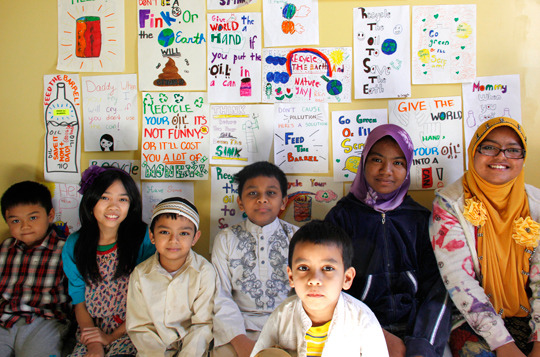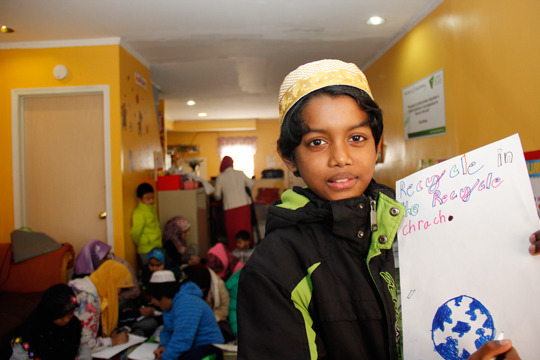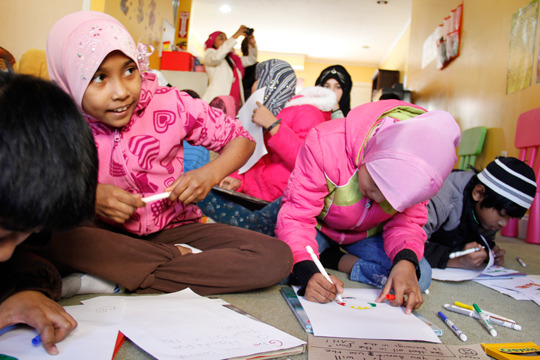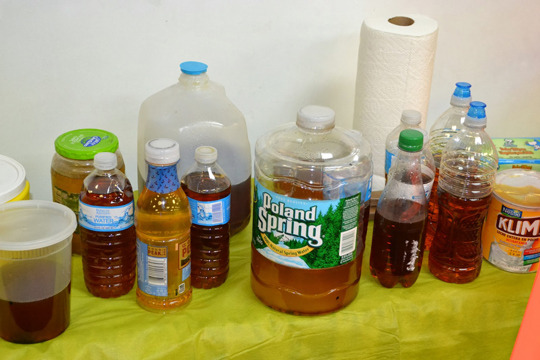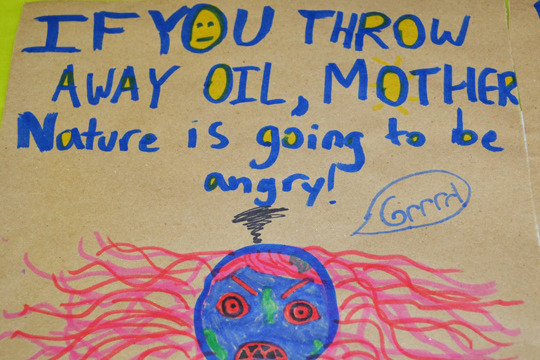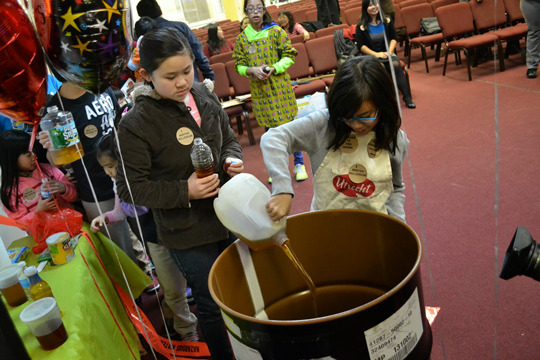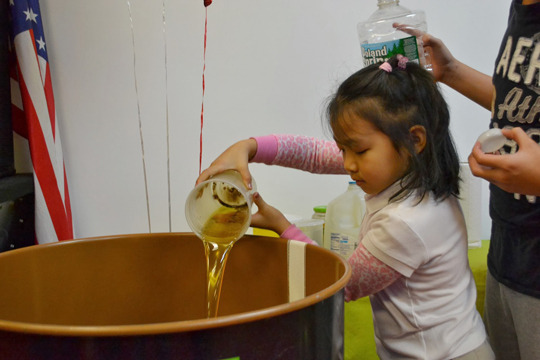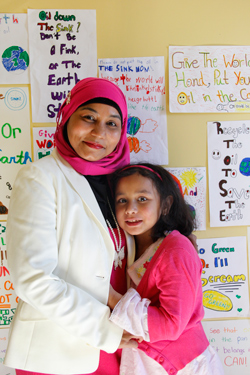 Cut Zahara, program director with Feed the Barrel, poses with her daughter, Geubrina Jalil. photos by Sahar Coston HardyWarm, welcoming and barefoot. That is Cut Zahara, owner of Barizkhy Daycare. (It’s still fairly new, come on in and make yourself at home.) Although she’s a petite woman among a sea of children vying for attention, you can’t miss her—she’s the one with the hot pink scarf wrapped around her head.
Cut Zahara, program director with Feed the Barrel, poses with her daughter, Geubrina Jalil. photos by Sahar Coston HardyWarm, welcoming and barefoot. That is Cut Zahara, owner of Barizkhy Daycare. (It’s still fairly new, come on in and make yourself at home.) Although she’s a petite woman among a sea of children vying for attention, you can’t miss her—she’s the one with the hot pink scarf wrapped around her head.Zahara (whose first name is pronounced “choot”) is one of the program directors of Feed the Barrel, Philadelphia’s first residential cooking oil recycling program. Members of the Indonesian Diaspora Network of Greater Philadelphia, a local chapter of the national organization, created the pilot in early 2013 with the help of the Environmental Protection Agency’s Asian Pacific American Council, which serves communities that are typically under-represented. In Indonesia, families have more space—big backyards and gardens—and so dumping used cooking oil outside was never an issue. But in Philadelphia, where open space is limited, many Indonesians resort to throwing away their oil after cooking with it; or worse, pouring it down the drain, where it would block their pipes as well as city-owned water mains, making for some very expensive plumbing fixes.
“We as a community … never dealt with this problem in our country before,” Zahara says. She moved from Aceh, Indonesia, in 2000 and has lived in the U.S. since then. “We [Indonesians] use a lot of cooking oil, we fry everything, so that’s why … after we use it, we just pour it down the sink; that’s how we dealt with it before. [But] now we know how to do it better.”
At a meeting in early 2013, members of the Indonesian Diaspora Network of Greater Philadelphia decided that Zahara, who has been an activist and a speaker on environmental and human rights issues for 14 years, was the kind of champion that Feed the Barrel needs. Zahara and Merlin Lamson, project manager, were chosen after the community leaders saw “the scope of the project, and realize we need back-up,” says Hani White, chairwoman for the Indonesian Diaspora Network of Greater Philadelphia.
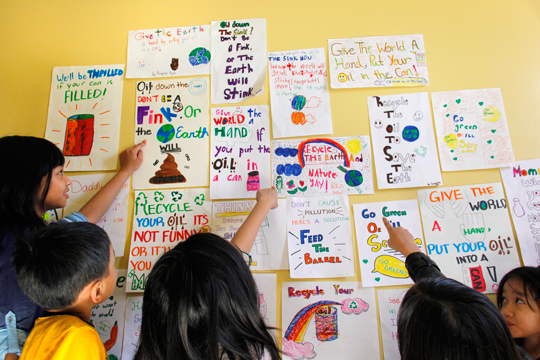 Children point to signs they made that encourage their parents to save used cooking oil.Now, because of Feed the Barrel, Philadelphians can take their used cooking oil to more than 10 drop-off locations in South Philadelphia, including Zahara’s daycare at 634 Emily Street and a handful of churches. The used oil is poured into a 55-gallon drum at each site—donated and collected by South Philadelphia oil-recycling company Eden Green Energy. Now they just need to get the word out.
Children point to signs they made that encourage their parents to save used cooking oil.Now, because of Feed the Barrel, Philadelphians can take their used cooking oil to more than 10 drop-off locations in South Philadelphia, including Zahara’s daycare at 634 Emily Street and a handful of churches. The used oil is poured into a 55-gallon drum at each site—donated and collected by South Philadelphia oil-recycling company Eden Green Energy. Now they just need to get the word out.
As a way to help train older generations to save used cooking oil, Zahara and Feed the Barrel partners hosted an event in January that placed the focus on teaching children to talk to their parents about the issue, specifically by creating signs to encourage them to save their cooking oil. During one gray, rainy Saturday, at 634 Emily Street in South Philadelphia, Zahara hosted the first “Train the Trainer,” which was filmed to show other groups of children how they, too, can play a role in oil recycling.
Zahara buzzes around getting everyone settled after their pizza lunch. There are 25 children on the first floor of this South Philadelphia row home, sitting with backs to the yellow walls, socked feet wriggling over the carpet or folded beneath them. Now they will learn how they can help their mothers and fathers properly dispose of cooking oil. [»]
“Today, we will learn something new,” Zahara tells them. “We want to teach you how to tell your mother what to do about this problem.”
Here to help are Lena Kim, who works for the Environment Protection Agency, and Sage Piszek, a salesman from Eden Green Energy. Kim has pulled her long hair into a knot and wears a pinstriped apron over a black tunic and tights. She stirs imaginary food in her frying pan with a wooden spoon, which clacks as she does so. “Who do I look like?” she prods in a cheerful voice. She wants them to call out that she looks like their mothers. They don’t. She nudges a little more: “Don’t I look like your mom?”
Kim has props and visual aids to show the children that once mom is done cooking, she has to do something with the cooking oil. Mom probably dumps it in the sink, she says, holding up a white bowl and pipe section. Then she shows them the gummy wad that represents cooking oil, which can block pipes and lead to costly plumbing bills. To prevent this, Kim explains that instead, their parents should save up their cooking oil in empty containers and take it to an oil recycling drop-off site, where they’ll deposit the used oil into a drum that Eden Green Energy will empty when full.
“People who don’t have handyman at home” need a solution, Zahara says. “I used to put it down the drain, and now I know better.”
Now, their mothers and fathers can save up their cooking oil in a bottle to bring to a drop-off site. “The Earth is saying, ‘Give me a break,’ ” Piszek says, crouching down to look into the children’s faces. He says his company gives Earth that break by collecting used cooking oil, processing out bits of food, and turning it into compost and biodiesel.
The “Train the Trainer” event ends and each child leaves the location—which also serves as a House of Learning-Dompet Dhuafa USA—with a sign he or she has drawn to remind parents to recycle their used cooking oil. Aldo Siahaan, a pastor at one of the drop-off locations, says that training older community members will be a challenge: “It’s not gonna be easy, but it’s worth it.”
Feed the Barrel is part of the EPA’s Food Recovery Challenge, a voluntary program that asks participants to reduce their food waste (more than 40 percent of our food ends up in the landfill, and cooking oil is a part of that). The EPA’s Kim says the agency wanted to take a community-wide approach to see whether oil disposal education and collection points would even work. The recycling aspect was actually icing on the cake because Eden Green Energy is also sustainability focused, Lena says.
In addition to having donated the oil drums for Feed the Barrel, Eden Green Energy, which typically pays commercial clients to collect oil, plans to donate a small percentage per gallon of collected oil and give that back to the Indonesian community in South Philadelphia.
Working with Feed the Barrel is Eden Green Energy’s first experience recycling oil in a residential setting; the company usually works with restaurants, hotels, universities and casinos. Although it’s a smaller volume than they are used to picking up, Piszek is optimistic that once the word gets out about Feed the Barrel, more people will drop off their used oil.
“We’re going more for exposure,” he says. “We’re hoping by the end of the year, if we collect about 10 drums, that will be a fantastic accomplishment,” Piszek says. So far, the community has filled a barrel and a half. He adds that working with Feed the Barrel has been “fantastic.” Kim says that word is spreading—Norristown and Princeton contacted Eden Green Energy about how to start up their own programs. She adds that Feed the Barrel supporters presented the pilot to the Mayor’s Commission on Asian American Affairs in early April to encourage other communities to consider residential oil collection and recycling.
“Things have far exceeded initial expectations,” she says.
Kim, whose children attended the Albert Greenfield school, first became involved in the issue in mid-2012, when she heard Indonesian mothers in the schoolyard talking about problems associated with dumping cooking oil down the drain. Because of her employment at the EPA, Kim was in a position to ask for help. The decision to involve children also started early.
“In a parallel discussion, parents in the schoolyard realized this is not only a problem, but laughed about how the kids are going to be the best advocates,” Kim says.
Zahara says that her passion for teaching kids and others about doing better with oil and our natural resources is one of the reasons she feels strongly about working with Feed the Barrel. “It’s a really great way to train our kids,” says Zahara, who has three children. “And they’re really excited. … Some of them really like the science class at their school, and this has become like a science class to them.” She adds that giving the children the responsibility to teach their parents means a lot to them: “They really feel so proud of themselves.”
With contributions from the children, parents, churches, the EPA and Eden Green Energy, Zahara is a reluctant face of Feed the Barrel. “I am nothing without the EPA, Hani, Merlin, everybody,” she says. “One woman can do anything—many women can do many things.”
story by Rosella LaFevre & Sara Schwartz
Feed the Barrel Drop-offs
Have used cooking oil? You can bring it to any of these 14 locations.
- Bethany Community Church: 1709 S. Broad St.
- Christ (ROCK Ministry): 713 Moore St.
- Hani’s Community Garden: 1809 S. 32nd St.
- House of Learning-Dompet Dhuafa USA: 634 Emily St.
- Holy Redeemer Chinese Catholic Church and School: 915 Vine St.
- Indonesian Christian Church: 1738 S. 19th St.
- Indonesia Full Gospel Fellowship Church: 2026 S. 13th St.
- International Bethel Church: 1619 S. Broad St.
- JC Bake Shop: 1730 Snyder St.
- Philadelphia Praise Center: 1701 McKean St.
- Nations Worship Center: 2703 Dudley St.
- QQ Mart: 1608 West Passyunk Ave.
- Seulanga Cafe: 1838 S. 18th Street
- St. Thomas Aquinas Catholic Community: 1719 Morris St.
FOR MORE information call 267-432-6807 or email Kim.Lena@epa.gov.


